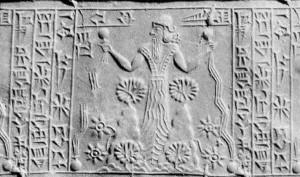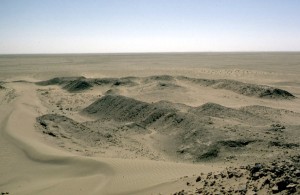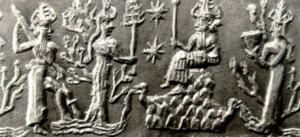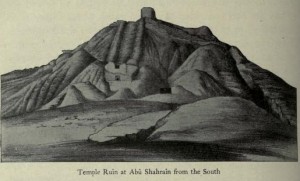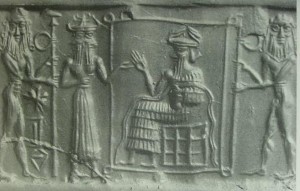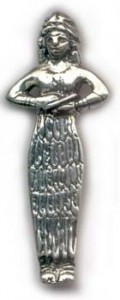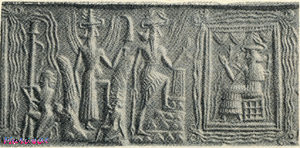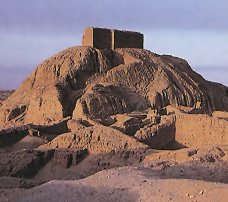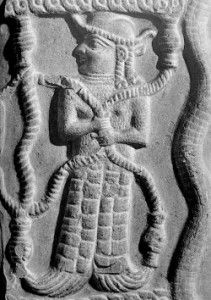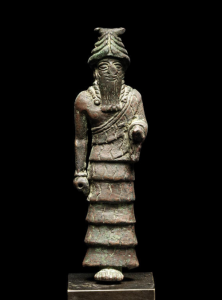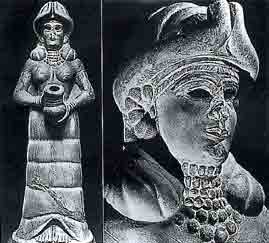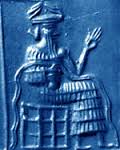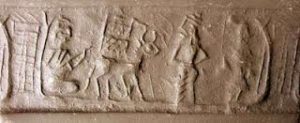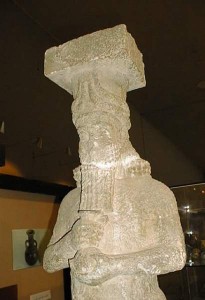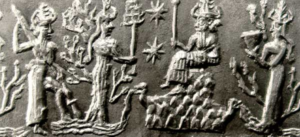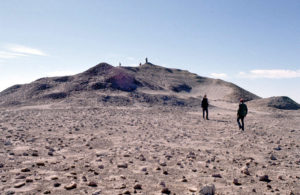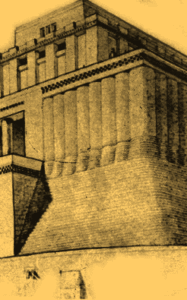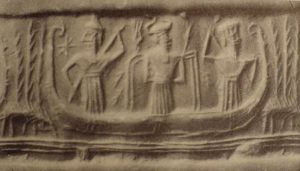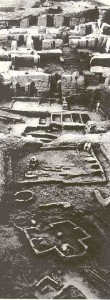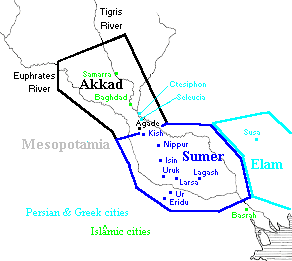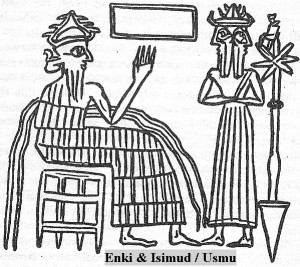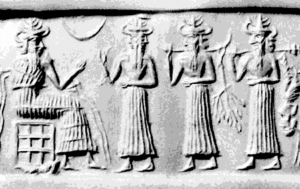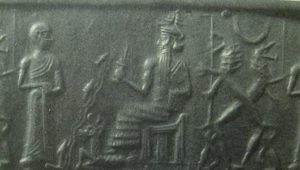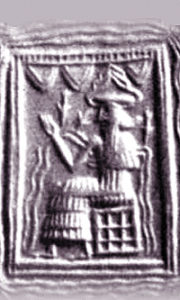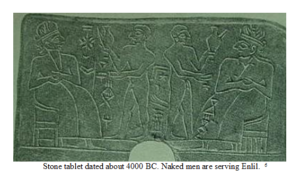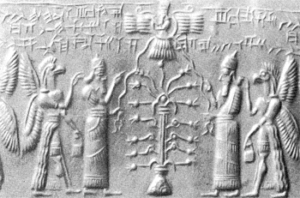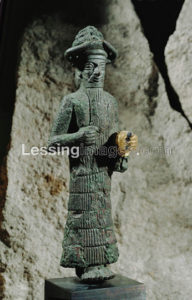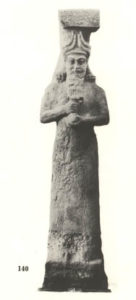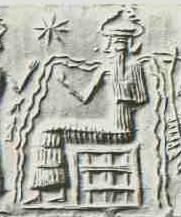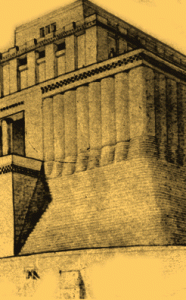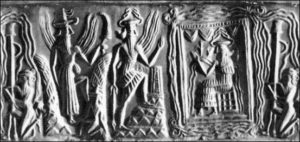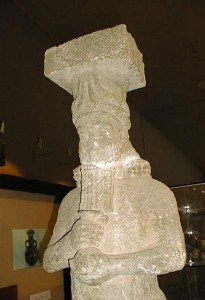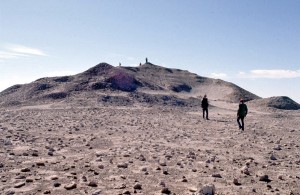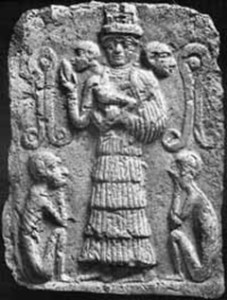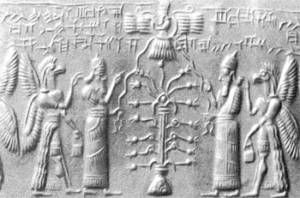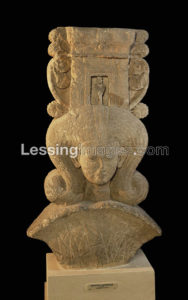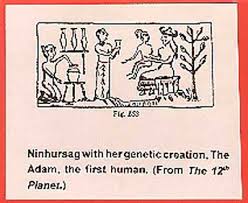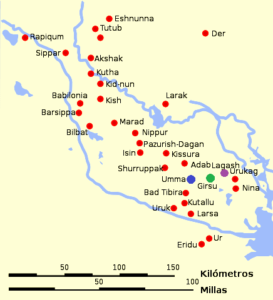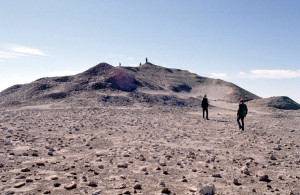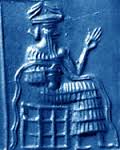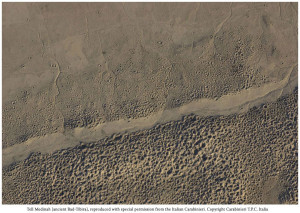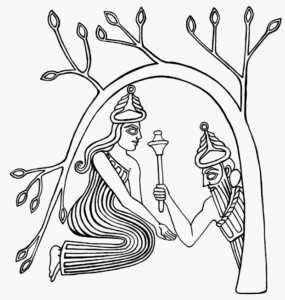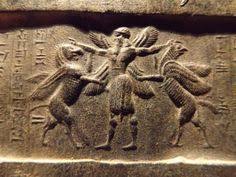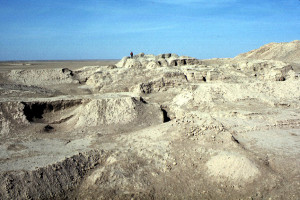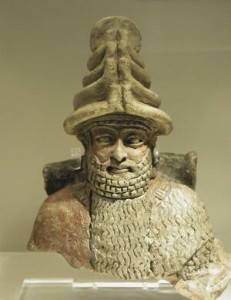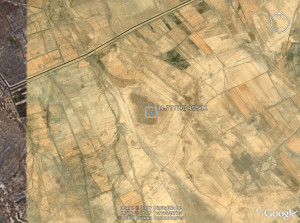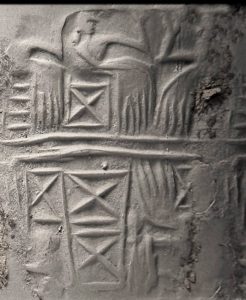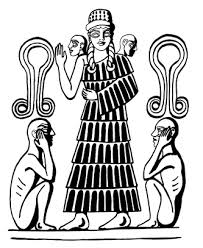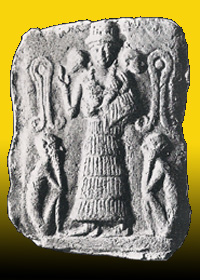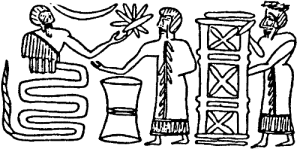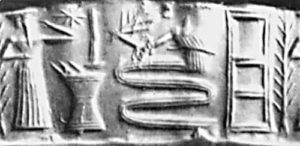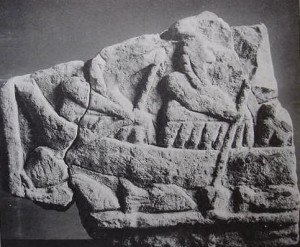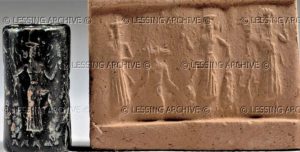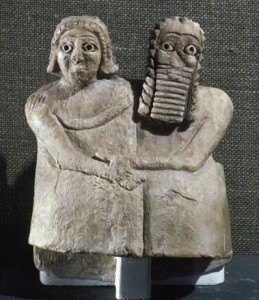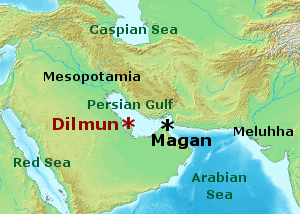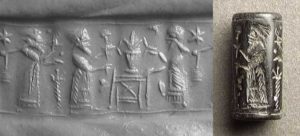SEE SITCHIN’S EARTH CHRONICLES, ETC.:
(Texts: All Artifacts, Color Coding, & Writings in Bold Type With Italics Inside Parenthesis, are Added by Editor R. Brown, not the Authors, Translators, or Publishers!)
(gods in blue …mixed-breed demigods in teal…)
Marduk’s urgent message to his father, describing a near-calamity on the flight to Earth:
“It has been created like a weapon;
It has charged forward like death…
The Anunnaki who are fifty it has smitten…
The flying, birdlike Supreme Orbiter it has smitten on the breast …”
In Marduk’s Babylonian re-written accounts of Sumerian history, he claimed that it was he who defeated Zu (Anzu) and regained the Tablets of Destinies instead of Ninurta:
“I have crushed the skull of the god Zu. …”
The text reports a conversation between father and son…with a difficult question:
“Enki answered his son Marduk:
‘My son, what is it you do not know?
What more could I give to you?
Marduk, what is it that you do not know?
What could I give you in addition?
Whatever I know, you know!’ …”
Ra as the engineer (“Extender of the Chord”) who built the “Protected Place” in the “Sacred Desert,” from which he could “ascend beautifully” and “traverse the skies”:
“Thou extendest the chords for the plan, thou didst give form to the lands…
Thou didst make secret the Lower World…
Thou hast built for thee a place protected in the sacred desert, with hidden name.
Thou risest by day opposite them…
Thou art rising beautifully…
Thou art crossing the sky with a good wind…
Thou art traversing the sky in the celestial Barque…
The sky is jubilating, the Earth is shouting joy.
The crew of Ra do praising every day;
He comes forth in triumph. …”
“there did the boat-wrecking waters carry the espoused of Inanna…. …”
Having disapproved of the Dumuzi–Inanna love match from the beginning, Marduk no doubt was even more opposed to the union after the Pyramid Wars. The rape of Geshtinanna by Dumuzi—was thus an opportunity for Marduk to block the designs Inanna had on Egypt, by seizing and punishing Dumuzi.
As far as she (Inanna) was concerned, Marduk had caused her beloved’s death. And as the (Akkadian) text makes clear
“What is in holy Inanna’s heart?
To Kill!
To kill the Lord Bilulu (Marduk) …”
Inanna armed herself with an array of weapons to attack the god in his hiding place…she confidently approached The Mountain, which she called E.BIH (Abode of Sorrowful Calling”). Haughtily she proclaimed:
“Mountain, thou art so high, thou art elevated above all others…
Thou touchest the sky with thy tip…
Yet I shall destroy thee,
To the ground I shall fell thee..
Inside thine heart pain I shall cause. …”
As Inanna continued to challenge Marduk, now hiding inside the mighty structure (pyramid), her fury rose…
“For the second time, infuriated by his pride,
Inanna approached (the pyramid) again and proclaimed:
‘My grandfather Enlil has permitted me to enter inside The Mountain! …”
Flaunting her weapons, she haughtily announced:
“Into the heart of the Mountain I shall penetrate…
Inside the Mountain, my victory I shall establish! …”
She began to attack:
“She seized not striking the sides of E-Bih and all its corners,
even its multitude of raised stones.
But inside…the Grest Serpent who had gone in his poison ceased not to spit …”
The record of the trial and sentencing of Marduk is available from a fragmentary text…begins where the gods had surrounded the pyramid. A god…a spokesman, addressed Marduk “in his enclosure”;
“the one who was evil he implored …”
Marduk was moved by the message:
“Despite the anger of his heart, clear tears came into his eyes …”
The trial was held within sight of the pyramids, in a temple by the riverbank:
“To the place of reverence, by the river,
with him who was accused they stepped.
In truth they made the enemies stand aside.
Justice was performed …”
In sentencing Marduk the mystery of Dumuzi’s death posed a problem…Standing there, in sight of the pyramids, with Marduk fresh out of his hiding place, the solution dawned on Inanna, and she proceeded to address the gods:
“On this day, the Lady herself,
She who speaks truth,
The accuser of Azag, the great princess,
An awesome judgment uttered …”
There was a way to sentence Marduk to death without actually executing him, she said:
“Let him be buried alive within the Great Pyramid!
Let him be sealed there as in a gigantic envelope!
In a great envelope that is sealed,
With no one to offer him nourishment;
Alone to suffer,
The potable watersourse to be cut off. …”
The judging gods accepted her suggestion:
“The mistress art thou…
The fate thou decrreest: let it be so! …”
Assuming that Anu would go along with the verdict,
“The gods then placed the command to Heaven and Earth …”
The E.KUR, the Great Pyramid, had become a prison; and one of the epithets of its mistress was, thereafter,
“Mistress of the Prison …”
Marduk had air to breathe; but he had neither food nor water…doomed to die in agony.
The ancient “script” begins with an introduction of the actors. The first one
“is Bel, who was confined in The Mountain …”
Then there is the messenger who brings the news of imprisonment to Marduk’s son Nabu…Nabu hastens to The Mountain in his chariot. He arrives at a structure
“that is the house on the edge of The Mountain
wherein they questioned him …”
They are told that the agitated god is
“Nabu who from Borsippa comes.
It is he who comes to seek
after the warefare of his father, who is imprisoned …”
Actors then come out, and rush about…
“they are the people who in the streets hasten;
they seek Bel saying:
Where is he held captive? …”
We learn from the text that:
“after Bel had gone into The Mountain,
the city fell into tumult …”
“because of him fighting within it broke out …”
A goddess appears; she is Sarpanit, the sister-wife of Marduk. She is confronted by a messenger
“who weeps before her, saying:
‘Unto The Mountain they have taken him.’ …”
He shows her the garments of Marduk (possibly bloodstained):
“these are his raiment, which they took off him …”
Marduk
“with a Garment-of-Sentence was clothed …”
“That means: in a coffin he is …”
Sarpanit goes to a structure that symbolizes Marduk’s tomb. She sees a group of mourners. The script explains:
“These are those who make lament
after the gods had locked him up,
separating him from among the living.
Into the House of Captivity,
away from the sun and light, they put him in prison …”
Sarpanit recites an appeal…
“She prays to Sin and Shamish, saying:
‘Give life to Bel!’ …”
Offerings are made to Ishtar,
“that she may show her mercy …”
The high priest appeals to the supreme god, to Sin, and to Shamash:
“Restore Bel to life! …”
…who represents Marduk, clothed with shrouds which
“with blood are dyed …”
speaks out:
“’I am not a sinner!
I shall not be smitten!’ …”
He announces that the supreme god has reviewed his case and found him not guilty.
The attention is diverted to a doorpost;
“it is the doorpost of Sarpanit in Babylon …”
“That is the head of the evil doer,
whom they shall smite and slay …”
Nabu…
“comes back from Borsippa;
he comes and stands over the evildoer and regards him …”
“The one whose sin it was …”
is carried away in a coffin. The murderer of Dumuzi has paid with his life. Sarpanit reappears…
“It is water for hand-washing
which they bring after The Evildoer has been carried away …”
In “all the sacred places of Bel” torches are lit….The supremacy of Ninurta…is reasserted…the divine messenger Nusku (did)
“announce the (good) tidings to all the gods …”
“How can they let him free,
the one who cannot come out? …”
Nusku, the divine messenger, tell her (Sarpanit) that Marduk shall pass through SA.BAD, the “chiseled upper opening.” He explains that it is
“A doorway-shaft which the gods will bore;
Its vortex they will lift off, his abode they shall reenter.
The door which was barred before him
At the vortex of the hollowing, into the sides,
a doorway they shall twistingly bore;
Getting near, into its midst they will break through. …”
The Anunnaki realized that the shortest and quickest way to reach the starved Marduk was to tunnel a connecting shaft…a tunneling of a mere thirty-two feet…
“burst open by a tremendous force
Getting near, into its midst they will break through …”
Having broken through into the Grand Gallery, the rescuers led Marduk back the way they came. The entry from the Descending Passage was sealed up again, to be (later) discovered by Al Mamoon’s men.
(Ra) went into exile…in Egypt Ra acquired the epithet Amen, “The Hidden One.” Circa 2000B.C., he reappeared to claim again supremacy; for that, mankind ended paying a most bitter price.
Sargon “in his old age” made a big mistake: He took away soil from Babylon and built upon the soil another Babylon beside Agade…
“On account of the sacrilege Sargon thus committed,
the great lord Marduk became enraged
and destroyed his people by hunger.
From the east to the west he alienated them from Sargon;
and upon him he inflicted as punishment that he could not rest …
The soil from the trenches of Babylon he removed,
and the boundaries of Akkad he made like those of Babylon.
But because of the evil which he had committed,
the great lord Marduk was angry, and he destroyed his people by famine…. …”
one text states:
|
“He dug up the dirt of the pit of Babylon and
|
|
made a counterpart of Babylon next to Agade.
|
|
Because the wrong he had done the great lord Marduk became angry
and wiped out his family by famine.
|
|
From east to west, the subjects rebelled against him
|
|
and Marduk afflicted him with insomnia. …”
|
1,500 years later, the Weidner Chronicle (ABC 19) accounts for the Gutian period as follows:
“Naram–Sin destroyed the people of Babylon,
so twice Marduk summoned the forces of Gutium against him …”
Marduk gave his kingship to the Gutian force.
“The Gutians were unhappy people unaware how to revere the gods,
ignorant of the right cultic practices … “
“Utu–hengal, the fisherman, caught a fish at the edge of the sea for an offering.
That fish should not be offered to another god
until it had been offered to Marduk,
but the Gutians took the boiled fish from his hand before it was offered,
so by his august command, Marduk removed the Gutian force
from the rule of his land and gave it to Utu-hengal …”
Unable or unwilling to remove Marduk by force, the Anunnaki turned to Marduk’s brother Nergal and asked him to
“scare Marduk off the divine seat … (in Babylon).”
A text named by scholars “The Erra Epos”, for in it Nergal is called… ER.RA…a derogatory epithet,…”The Servant of Ra.”...better called “The Tale of the Sins of Nergal” for it puts the blame on Nergal for a chain of events with a catastrophic ending…
“into the Esagil (Marduk’s temple – residence in Babylon), temple of Heaven and Earth,
he entered and stood before Marduk …”
Marduk explained that he had to take matters in his own hands:
“In the aftermath of the Deluge,
the decrees of Heaven and Earth had gone astray.
The cities of the gods upon the wide Earth were changed around;
They were not brought back to their locations…
As I survey them again, of the evil I am disgusted;
Without a return to their (original) places,
Mankind’s existence is diminished…
Rebuild I must my residence which in the Deluge was wiped away;
Its name (I must) call again. …”
…failures on the part of Erra himself to account for certain divine artifacts–
“the instrument of giving orders,
the Oracle of the gods; the sign of kingship,
the Holy Scepter which contributes brilliance to Lordship…
Where is the Holy Radiating Stone which disintegrates all? …”
Marduk asked. If he were forced to leave,
“on the day I step off my seat,
the flooding shall from its well cease to work…
the waters shall not rise…
the bright day to darkness (shall return)…
confusion shall arise…
the winds of drought shall howl…
sickness shall spread. …”
After some more exchanges Erra offered to return to Marduk’s possession
“the artifacts of Heaven and Earth …”
He assured Marduk there was nothing to worry about: he (Erra) would enter Marduk’s house only to
“erect the Bulls of Anu and Enlil at thy gate …”
statues of winged bulls as were actually found at temple sites…
“Marduk heard this;
The promise, given by Erra, found his favor.
So did he step down from his seat,
and to the Land of Mines, abode of the Anunnaki, he set his direction …”
Marduk agreed to leave Babylon. But no sooner he had done that than Nergal broke his word. Nergal / Erra ventured into the Gigunu, the mysterious underground chamber…and there Erra caused its “Brilliance” to be removed…as Marduk had warned,
“the day turned into darkness, flooding was disarrayed,
the lands were laid to waste, the people were made to perish …”
“With anger (at Erra) they were filled …”
Ea (Enki), Erra’s father, reproached him:
“Now that the Prince Marduk had stepped off, what have you done? …”
“Go away! …”
he ordered Erra.
“Take off to where no gods ever go! …”
“Erra lost his voice …”
“As to my warriors, they shall not go back. …”
The departure of Marduk from Babylon brought an end Ishtar’s conflict with him.; the rift between Marduk and Nergal…created an alliance between Ishtar and Nergal.
It was exactly when Abraham, accompanied by an elite military corps, left Harran,–the gateway to the Hittite lands—that the exiled and wondering Marduk appeared in “Hatti lands.”–...Marduk stayed there through the same twenty-four Fateful Years , the years that culminated with the Great Disaster…aging Marduk tells of his erstwhile wanderings and eventual return to Babylon:
“O great gods, learn my secrets.
As I girdle my belt, my memories remember:
I am the divine Marduk, a great god.
I was cast off for my sins,
to the mountains I have gone.
In many lands I have been a wanderer:
From where the sun rises to where it sets I went.
To the heights of Hatti-land I went.
In Hatti-land I asked an oracle
(about) my throne and my Lordship;
In its midst (I asked):
‘Until when?’
24 years, in its midst, I nested. …”
It was a place, we suggest, which the Bible called Kadesh-Barnea, and there Abraham stood with his elite troops, blocking the invaders’ advance to the Spaceport proper…it was intended to prevent the return of Marduk and thwart the efforts of Nabu to gain access to the Spaceport.
…Marduk’s desire to make Babylon “the heavenward naval in the four regions.” It was to thwart this that the gods opposing Marduk ordered Khedorla’omar to seize and defile Babylon:
“The gods…
to Kudur-Laghamar, king of the land of Elam,
they decreed: ‘Descend there!’
That which to the city was bad he performed;
In Babylon, the precious city of Marduk, kingship he overthrew;
To herds of dogs its temple he made a den;
Flying ravens, loud shrieking, their dung dropped there …”
After the “bad deeds” were done there, Utu / Shamash sought action against Nabu, who (he had said in accusation) had subverted the allegiance of a certain king to his father.
“Before the gods the son of his father (came);
On that day Shamash, the Bright One, against the lord of lords,
Marduk (he said):
‘The faithfulness of his heart (the king) betrayed–
in the time of the thirteen year a falling-out against my father (he had);
to his faith-keeping the king ceased to attend;
all this Nabu has caused to happen.’ …”
But at Dur-Mah-Ilani, according to the Babylonian text,
“the son of a priest,
whom the gods in their true counsel had anointed, …”
stood in the invaders’ way and “the despoiling prevented.”
Could the Babylonian text indeed refer to Abraham, the son of Terah the priest…?(high-priest of Ur)
2123 B.C. . Abraham was born in Nippur to his father Terah
2113 B.C. . Ur-Nammu (Ninsun’s mixed-breed son) enthroned in Ur, given guardianship in Nippur
Terah and his family move to Ur
2095 B.C. . Shulgi (Ninsun’s mixed-breed son) ascends throne after death of Ur-Nammu
Terah and his family leave Ur for Harran
2055 B.C. . Shulgi receives (uncle) Nannar’s oracles, sends Elamite troops to Canaan
2048 B.C. . Shulgi’s death ordered by Anu and Enlil
Abraham, seventy-five years old, ordered to leave Harran for Canaan
2047 B.C. . Amar-Sin (Shulgi’s son) (“Amarpal”) ascends the throne of Ur
Abraham leaves the Negev for Egypt
2042 B.C. . Canaanite kings switch allegiance to “other gods”
Abraham returns from Egypt with elite corps
2041 B.C. . Amar-Sin launches the War of the Kings
2041 B.C., the year of the military expedition—also MU NE IB.RU.UM BA.HUL, “Year (in which) the Shepherding-abode of IB.RU.UM was attacked”`
Abraham protects the Spaceport in “The Kings’ War”
Ibbi-Sin (Shu-Sin’s mixed-breed son) put his trust again in Nannar and Inanna, installing himself in his second year as High Priest of Inanna’s temple in Uruk…In the fourth year of his reign he was told that
“The Son in the west will arise…
it is an omen for Ibbi-Sin: Ur shall be judged …”
In his fifth year, Ibbi-Sin sought further strength by becoming High Priest of Inanna at her shrine in Ur.. But that too was no help…As the sixth year began, the omens “concerning destruction” became more urgent and more specific.
“When the sixth year comes,
the inhabitants in Ur will be trapped, …”
Another omen said,
“When for the second time, he who calls himself Supreme,
like one whose chest has been anointed, shall come from the west. …”
That very year, as messages from the borders reveal,
“hostile Westerners had entered the plain …”
of Mesopotamia; without resistance, they quickly
“entered the interior of the country,
taking one by one all the great fortresses …”
Marduk, as the omens had predicted, returned to Babylon for the second time.
“In Hattiland I asked an oracle (about) my throne and my Lordship;
In its midst (I asked); ‘Until when? …”
Then, in that twenty-fourth year, he received a favorable omen:
“My days (of exile) were completed;
To my city (I set my course);
My temple (residence) Esagila as a mount (to raise / rebuild),
My everlasting abode to (reestablish).
I raised my heels (toward Babylon)
Through…lands (I went) to my city
her (future / well-being) to establish,
A king in Babylon to (install)
In the house of my covenant…
In the mount-like Esagil…
By Anu created…
Into the Esagil…
A platform to raise…
In my city…
Joy. …”
“chase away evil and bad luck…
bring motherly love to Mankind. …”
It was then that the holy city was despoiled and its shrine, the Ekur (Enlil’s temple – residence in Nippur), desecrated. Ninurta accused the followers of Marduk of this evil deed; but it was not so; it was his ally Nergal / Era who had done it!
“Erra , the pitiless one, entered the sacred precinct.
He stationed himself in the sacred precinct, he beheld the Ekur.
His mouth he opened, he said to his young men:
‘Carry off the spoil of Ekur, take away its valuables,
destroy its foundation, break down the enclosure of the shrine!’ …”
When Enlil, “loftily enthroned,” heard that his temple had been destroyed, its shrine defiled, that “in the holy of holies the veil was torn away”, he rushed back to Nippur.
“Riding in front of him were gods clothed with radiance; …”
he himself,
“set off brilliance like lightning as he came down from the skies;
made the holy place shake …”
as he ascended to the sacred precinct. Enlil then addressed himself to his son, “the prince Ninurta.” to find out who defiled the sacred place. But instead of telling the truth, that it was Erra, his ally, Ninurta pointing the accusing finger at Marduk and his followers…
The Babylonian text asserts that Ninurta was acting without the required respect of meeting with his father:
“not fearing for his life, he removed not his tiara …”
To Enlil
“evil he spoke…
there was no justice, destruction was conceived. …”
“Enlil against Babylon caused evil to be planned …”
In addition to “evil deeds” against Marduk and Babylon, an attack against Nabu and his temple Ezida in Borsippa was also planned. But Nabu managed to escape westward
“Fron Ezida…
Nabu, to marshal all his cities set his step;
Toward the great sea he set his course …”
…verses in the Babylonian text…have a direct parallel in the biblical tale of the destruction of Sodom and Gomorrah:
“But when the son of Marduk in the land of the coast was,
He-of-the-Evil-Wind (Erra) with heat the plain-land burnt …”
“He (Nabu) the great sea entered,
Sat upon a throne which was not his
(Because) Ezida, the legitimate abode, was overrun …”
Enki stood by his firstborn son:
“Now that Prince Marduk has arisen,
now that the people for the second time have raised his image,
why does Erra continue his opposition? …”
Finally, loosing his patience, Enki shouted at Nergal to get out of his presence. Leaving in a huff, Nergal returned to his domain. “Consulting with himself,” he decided to unleash the awesome weapons:
“The lands I will destroy, to a deep dust-heap make them;
the cities I will upheaval, to desolation turn them;
the mountains I will flatten, their animals make disappear;
the seas I will agitate, that which teems in them I will decimate;
the people I will make vanish, their souls shall turn to vapor;
none shall be spared. …”
We learn from a text…that it was Gibil, whose domain in Africa adjoined that of Nergal, who alerted Marduk to the destructive scheme hatched by Nergal…It was then that Gibil “these words to Marduk did speak” in regard to the
“seven awesome weapons which Anu created..
The wickedness of those seven against thee is being laid, …”
he informed Marduk. Marduk inquired of Gibil where the awesome weapons were kept. “O Gibil,,” he said, “those seven—where were they born, where were they created?” To which Gibil revealed that they were hidden underground:
“Those seven, in the mountain they abide,
in a cavity inside the earth they dwell.
From this place with a brilliance they will rush forth,
From Earth to Heaven, clad with terror. …”
But where exactly is this place? Marduk asked again and again; and all Gibil could say was that “even the wise gods, to them it is unknown.”Now Marduk rushed to his father Enki with the frightening report.
“To his father Enki’s house he (Marduk) entered …”
Enki was lying on the couch in the chamber to which he retired for the night. “My father” Marduk said,
“Gibil this word hath spoken to me:
of the coming of the seven (weapons) he has found out. …”
Telling his father the bad news, he urged his all-knowing father:
“Their place to search out, do hasten thou! …”
Enki spoke out strongly against the idea, urging steps to stop Nergal, for the use of the weapons, he pointed out,
“the lands will make desolate, the people will make perish. …”
Nannar and Utu wavered as Enki spoke, but Enlil and Ninurta were for decisive action. And so with the Council of the Gods was in disarray, the decision was left to Anu.
Nergal had already ordered the priming of “the seven awesome weapons” with their “poisons.”,
“Anu, lord of the gods, on the land had pity …”
It was then that Ninurta, attempting to dissuade Nergal from indiscriminate annihilation, used words identical to those attributed in the Bible to Abraham when he tried to have Sodom spared:
“Valiant Era (Nergal),
Will you the righteous destroy with the unrighteous?
Will you destroy those who have against you sinned
together with those who against you have not sinned? …”
The two gods argued back and forth on the extent of the destruction. More than Ninurta, Nergal was consumed by personal hatred:..he shouted
“I shall annihilate the son (Nabu), and let the father (Marduk) bury him;
then I shall kill the father, let no one bury him. …”
Ninurta finally swayed Nergal.
“He heard the words spoken by Ishum (Ninurta);
the words appealed to him as fine oil …”
Agreeing to leave alone the seas, to leave Mesopotamia out of the attack, he formulated a modified plan: the destruction will be selective..to destroy the cities where Nabu might be hiding…to deny Marduk the greatest prize—the Spaceport, “the place from where the Great Ones ascend…. …”
“From city to city an emissary I will send;
The son, seed of his father, shall not escape;
His mother shall cease her laughter…
To the place of the gods, access he shall not have:
The place from where the Great Ones ascend
I shall upheaval. …”
Wasting no more time, Nergal then urged Ninurta that the two of them go at once into action:
“Then did the hero Erra go ahead of Ishum, remembering his words;
Ishum too went forth, in accordance with the word given,
a squeezing in his heart …”
Their first target was the Spaceport, its command complex hidden in the “Mount Most Supreme,” its landing fields spread in the adjoining great plain:
“Ishum to Mount Most Supreme set his course;
The Awesome Seven, (weapons) without parallel, trailed behind him.
At the Mount Most Supreme the hero arrived;
He raised his hand–the mount was smashed;
The plain by the Mount Most Supreme he then obliterated;
in its forests not a tree-stem was left standing …”
So with one nuclear blow the Spaceport was obliterated…Now it was the turn of Nergal...Guiding himself through the Sinai peninsula to the Canaanite cities by folllowing the King’s Highway, Erra upheavaled them.
The words employed by the “Erra Epic” are almost identical to those used in the biblical tale of Sodom and Gomorrah:
“Then, emulating Ishum, Erra the King’s Highway followed.
The cities he finished off, to desolation he overturned them.
In the mountains he caused starvation, their animals he made perish. …”
The verses that follow may well describe the creation of the new southern portion of the Dead Sea…:
“He dug through the sea, its wholeness he divided.
That which lives in it, even the crocodiles he made wither.
As with fire he scorched the animals,
banned its grains to become as dust …”
We find descriptions and recollections of the nuclear upheaval in other texts as well:
“Lord, bearer of the Scorcher
that burnt up the adversary;
Who obliterated the disobedient land;
Who withered the life of the Evil Word’s followers;
Who raised stones and fire upon the adversaries …”
In a Babylonian text in which one king recalls the momentous events that had taken place “in the reign of an earlier king.”
“At that time, in the reign of a previous king, conditions changed.
Good departed, suffering was regular.
The Lord (of the gods) became enraged, he conceived wrath.
He gave the command: the gods of that place abandoned it…
The two, incited to commit the evil, made its guardians stand aside;
its protectors went up to the dome of heaven …”
The “Khedorlaomer Text”, which identifies the two gods by their epithets as Nergal and Ninurta, tells it this way:
“Enlil, who sat alone in loftiness, was consumed with anger.
The devastators again suggested evil;
He who scorches with fire (Ishum / Ninurta)
and he of the evil wind (Erra / Nergal) together performed their evil.
The two made the gods flee, made them flee the scorching …”
The target, from which they made the gods guarding it flee, was the Place of the Launching:
“That which was raised towards Anu to launch they caused to wither;
Its face they made fade away, its place they made desolate …”
Thus was the Spaceport, the prize of which so many Wars of the Gods had been fought, obliterated: the Mount within which the controlling equipment was placed was smashed; the launch platforms were made to fade off the face of the earth; and the plain whose hard soil the shuttle craft had used as runways was obliterated, and not even a tree left standing.
But the deed done by Nergal and Ninurta had not gone unrecorded, for it turned out to have a most profound effect on Sumer, its people, and its very existence…The nuclear explosion gave rise to an immense wind, a radioactive wind, which began as a whirlwind:
“A storm, the Evil Wind, went around in the skies …”
The desolation caused by the catastrophe is then described vividly, by such verses as these:
“Causing cities to be desolate, (causing) houses to become desolate;
Causing stalls to be desolate, the sheepfolds to be emptied;
That Sumer’s oxen no longer stand in their stalls,
that its sheep no longer roam in its sheepfolds;
That its rivers flow with water that is bitter,
that its cultivated fields grow weeds, that its steeps grow withering plants …”
In the cities and the hamlets,
“the mother cares not for her children,
the father says not ‘O my wife’…
the young child grows not sturdy on their knee,
the nursemaid chants not a lullaby…
kingship has been taken away from the land …”
“On the Land (Sumer) fell a calamity, one unknown to man:
One that had never been seen before, one which could not be withstood …”
It was an unseen death,
“which roams the street, is let loose in the road;
it stands beside a man–yet none can see it;
when it enters a house, its appearance is unknown …”
There was no defense against this
“evil which has assailed the land like a ghost:…
The highest wall, the thickest walls, it passes as a flood,
no door can shut it out, no bolt can turn it back;
through the door like a snake it glides,
through the hinge like a wind it blows in.
Cough and phlegm weakened the chest,
the mouth was filled with spittle and foam…
dumbness and daze have come upon them,
an unwholesome numbness…
an evil curse, a headache…
their spirit abandoned their bodies …”
it was a most gruesome death:
“The people, terrified, could hardly breathe;
the Evil Wind clutched them,
does not grant them another day…
Mouths were drenched in blood, heads wallowed in blood…
The face was made pale by the Evil Wind …”
“Covered the land as a cloak, spread over it like a sheet …”
Brownish in color, during the daytime
“the sun in the horizon it obliterated with darkness
(Girt with dread brilliance it filleth the broad earth) …”
it blocked out the moon:
“the moon at its rising it extinguished …”
Moving from west to east, the deadly cloud–
“enveloped in terror, casting fear everywhere
a great wind which speeds high above,
an evil wind which overwhelms the land …”
It was
“a great storm directed from Anu…
it hath come from the heart of Enlil.
In a single spawning it was spawned…
like the bitter venom of the gods; in the west it was spawned.
Bearing gloom from city to city,
carrying dense clouds that bring gloom from the sky …”
was the result of a
“lightning flash, from the midst of the mountains
it had descended upon the land,
From the Plain of No Pity it hath come …”
Though the people were baffled, the gods knew the cause of the Evil Wind:
“An evil blast heralded the baleful storm,
An evil blast the forerunner of the baleful storm was;
Mighty offspring, valiant sons were the heralds of the pestilence …”
As soon as the “awesome weapons” were launched from the skies, there was an immense brilliance
“they spread awesome rays towards the four points of the earth,
scorching everything like fire …”
“The storm, in a flash of lightning created, a dense cloud that brings gloom …”
followed by
“rushing wind gusts…
a tempest that furiously scorches the heavens …”
Several texts attest that the Evil Wind, bearing the cloud of death, was caused by gigantic explosions on a day to remember:
“On that day
When heaven was crushed and the Earth was smitten,
its face obliterated by the maelstrom–
When the skies were darkened and covered as with a shadow …”
Over Sumer, its passage lasting twenty-four hours—a day and a night…as in this…from Nippur:
“On that day,, on that single day; on that night, on that single night…
the storm, in a flash of lightning created, the people of Nippur left prostrate …”
The Uruk Lament
“The great gods paled at its immensity,
gigantic rays reach up to heaven (and) the earth tremble to its core …”
As the Evil Wind began to “spread to the mountains as a net,” the gods of Sumer began to flee their beloved cities...Thus
“Ninhursag wept in bitter tears …”
as she escaped from Isin. Nanshe cried,
“’O my devastated city…’
her beloved dwelling place was given over to misfortune …”
Inanna hurriedly departed from Uruk, sailing off toward Africa in a “submersible ship” and complaining that she had to leave behind her jewelry and other possessions…Inanna / Ishtar bewailed the desolation of her city and her temple by the Evil Wind
“which in an instant, in a blink of an eye
was created against the midst of the mountains, …”
and against which there was no defense…As the
“loyal citizens of Uruk were seized with terror …”
“’Rise up! Hide in the steppe!’
the deities ran off…
they took unfamiliar paths …”
“Thus all the gods evacuated Uruk;
They kept away from it;
They hid in the mountains,
They escaped to the distant plains …”
In Uruk…
“Mob panic was brought about in Uruk….
its good sense was distorted …”
…as the people asked questions:
“’Why did the gods benevolent eye look away?
Who caused such worry and lamentation?’ …”
When the Evil Storm passed over,
“the people were piled up in heaps…
a hush settled over Uruk like a cloak …”
Ninki, we learn from “The Eridu Lament”, flew away from her city to a safe haven in Africa:
“Ninki, its great lady, flying like a bird, left her city …”
But Enki left Eridu only far enough to get out of the Evil Wind’s way, yet near enough to see its fate:
“Its lord stayed outside the city…
Father Enki stayed outside the city…
for the fate of his harmed city he wept with bitter tears …”
They watched the storm “put its hand” on Eridu. After the
“evil-bearing storm went out of the city,
sweeping across the countryside, …”
Enki surveyed Eridu; he found the city
“smothered with silence…
its residents stacked up in heaps …”
Those who were saved addressed to him a lament:
“O Enki, thy city has been cursed, made like an alien territory! …”
…and Enki
“stayed out of his city as though it were an alien city …”
“Forsaking the House of Eridu, …”
Enki then led
“those who have been displaced from Eridu …”
to the desert, “towards an inimical land”; there he used his scientific powers to make the “foul tree” edible.
From Babylon, a worried Marduk sent his father, Enki, an urgent message as the cloud of death neared his city:
“’What am I to do?’ …”
he asked Enki’s advice…and in line with the advice given by the two emissaries to Lot, the people fleeing Babylon were warned
“neither to run nor to look back …”
They were also told not to take with them any food or beverage, for these might have been “touched by the ghost.”
“Get thee into a chamber below the earth, into a darkness, …”
until the Evil Wind was gone…In Lagash,
“mother Bau wept bitterly for her holy temple, for her city …”
Though Ninurta was gone, his spouse could not force herself to leave. Lingering behind, “O my city, O my city,” she kept crying; the delay almost cost her her life:
“On that day, the lady–the storm caught up with her;
Bau, as if she were mortal–the storm caught up with her …”
In Ur we learn from the lamentations (one of which was composed by Ningal herself) that Nannar and Ningal refused to believe that the end of Ur was irrevocable. Nannar addressed a long and emotional appeal to his father…Enlil’s reply was to say
“Ur was granted kingship–it was not granted an eternal reign.
Since days of yore, when Sumer was founded,
to the present, when people have multiplied–
Who has ever seen a kingship of everlasting reign? …”
While the appeals were made, Ningal recalled in her long poem,
“the storm was ever breaking forward,
its howling overpowering all.
Although of the day I still tremble,
of that day’s foul smell we did not flee …”
As night came, “a bitter lament was raised” in Ur, yet the god and goddess stayed on…and Ningal realized that Nannar
“had been overtaken by the evil storm …”
…Only next day, when
“the storm was carried off from the city Ningal, in order to go from her city…
hastily put on a garment, …”
and together with the stricken Nannar departed from the city they so loved. As they were leaving they saw death and desolation:
“the people, like potsherds, filled the city’s streets;
in its lofty gates, where they were wont to promenade,
dead bodies were laying about;
in its boulevards, where the feasts were celebrated,
scattered they lay; in all of its streets, where they were wont to promenade,
dead bodies were laying about;
in its places where the land’s festivities took place, the people lay in heaps.
The dead bodies, like fat placed in the sun, of themselves melted away …”
Then did Ningal raise her lamentation for Ur…
“O house of Sin in Ur, bitter is thy desolation…
O Ningal whose land has perished, make thy heart like water!
The city has become a strange city, how can one now exist?
The house has become a house of tears, it makes my heart like water…
Ur and its temples have been given over to the wind. …
On the banks of the Tigris and Euphrates, only sickly plants grew…
In the swamps grow sickly-headed reeds that rot in the stench…
In the orchards and gardens there is no new growth, quickly they waste away…
The cultivated fields are not hied, no seeds are planted in the soil,
no songs resound in the fields …”
In the countryside the animals were also affected:
“On the steppe, cattle large and small became scarce,
all living creatures came to an end.
The sheepfolds have been delivered to the wind…
The hum of the turning churn resounds not in the sheepfold…
The stalls provide not fat and cheese…
Ninurta has emptied Sumer of milk…
The storm crushed the land, wiped out everything;
it roared like a great wind over the land, none could escape it;
desolating the cities, desolating the houses…
No one treads the highways, no one seeks out the roads …”
The desolation of Sumer was complete.
The Year of Doom (nuclear holocaust)–2024 B.C.–was the sixth year of reign of Ibbi-Sin, the last king of Ur...
Anu and Enlil finally accepted Marduk’s claim to supremacy at Babylon. Commemorating the fateful decision in the preamble to his law code, the Babylonian king Hammurabi put it in these words:
“Lofty Anu, lord of themselves gods who from Heaven came to Earth,
and Enlil, lord of Heaven and Earth who determines the destinies of the land,
Determined for Marduk, the firstborn of Enki,
the Enlil–functions over all mankind;
Made him great among the gods who watch and see,
Called Babylon by name to be exalted,
Made it supreme in the world;
And established for Marduk, in its midst, an everlasting kingship. …”
Babylon, then Assyria rose to greatness. Sumer was no more…
